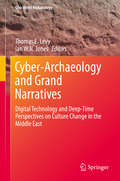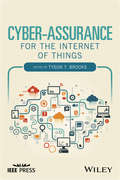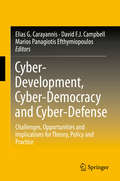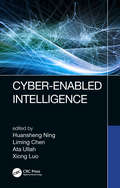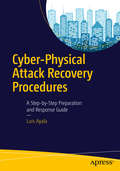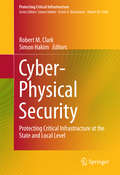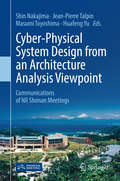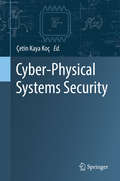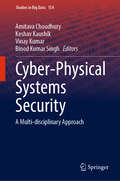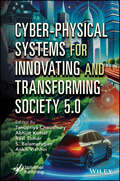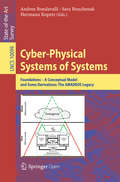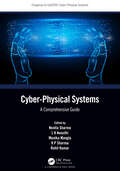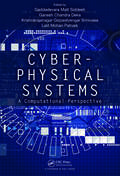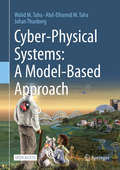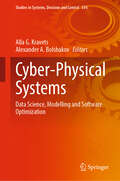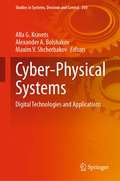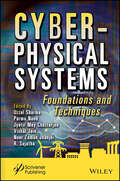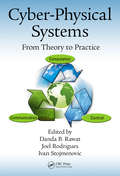- Table View
- List View
Cyber and Digital Forensic Investigations: A Law Enforcement Practitioner’s Perspective (Studies in Big Data #74)
by Kim-Kwang Raymond Choo Nhien-An Le-KhacUnderstanding the latest capabilities in the cyber threat landscape as well as the cyber forensic challenges and approaches is the best way users and organizations can prepare for potential negative events. Adopting an experiential learning approach, this book describes how cyber forensics researchers, educators and practitioners can keep pace with technological advances, and acquire the essential knowledge and skills, ranging from IoT forensics, malware analysis, and CCTV and cloud forensics to network forensics and financial investigations. Given the growing importance of incident response and cyber forensics in our digitalized society, this book will be of interest and relevance to researchers, educators and practitioners in the field, as well as students wanting to learn about cyber forensics.
Cyber and the City: Securing London’s Banks in the Computer Age (History of Computing)
by Ashley SweetmanCyber security is the greatest risk faced by financial institutions today, a risk they have understood and managed for decades longer than is commonly understood. Ever since the major London banks purchased their first computers in the early 1960s, they have had to balance their dependence on those machines with the need to secure their operations and retain the trust of their customers. Technological change in the second half of the 20th century prompted British banks to reevaluate their function as trusted protectors of wealth. In the City of London, the capital’s oldest area and historically its business and commerce hub, the colossal clearing banks employed newly commercialised electronic computers—the processing power of which could transform the highly clerical clearing and settlement process. What unfolded over the following three decades was a relentless modernisation drive. Revolutionising the way that banks and other financial institutions conducted business and interacted with each other and permanently altering the speed and scale at which the United Kingdom’s financial sector functioned, this rapid modernisation thrust computer security into the consciousness of bank executives and their clients alike. Dependence on computers quickly grew, and the banks immediately realised the need to secure their new software and hardware. Focusing on the period 1960 to 1990, this book uses newly released and previously unexplored archival material to trace the origins of cyber security in the UK financial sector. Topics and features: Describes how institutions managed the evolving challenge of computer security in the second half of the 20th century Demonstrates continuity in banks' views of security through the prism of confidentiality, integrity and availability, and the concept of resilience Presents case studies of bank collaboration on computer security through creation of payment systems like SWIFT and CHAPS Outlines the shift from focusing on physical security measures to technical network-protection measures Explores the relationship between banks and the UK Government as bank operations became dependent on computer and network technology This work will be of value to students and academic researchers in the history of computing, financial history, and the history of intelligence and security, as well as the general reader interested in contemporary intelligence, cyber security, and finance.
Cyber-Archaeology and Grand Narratives
by Thomas E. Levy Ian W. JonesThis volume asks how the current Information Technology Revolution influences archaeological interpretations of techno-social change. Does cyber-archaeology provide a way to breathe new life into grand narratives of technological revolution and culture change, or does it further challenge these high-level theoretical explanations? Do digital recording methods have the potential to create large, regional-scale databases to ease investigation of high-level theoretical issues, or have they simply exposed deeper issues of archaeological practice that prevent this? In short, this volume cuts beyond platitudes about the revolutionary potential of the Information Technology Revolution and instead critically engages both its possibilities and limitations. The contributions to this volume are drawn from long-term regional studies employing a cyber-archaeology framework, primarily in the southern Levant, a region with rich archaeological data sets spanning the Paleolithic to the present day. As such, contributors are uniquely placed to comment on the interface between digital methods and grand narratives of long-term techno-social change. Cyber-Archaeology and Grand Narratives provides a much-needed challenge to current approaches, and a first step toward integrating innovative digital methods with archaeological theory.
Cyber-Assurance for the Internet of Things
by Tyson T. BrooksPresents an Cyber-Assurance approach to the Internet of Things (IoT) This book discusses the cyber-assurance needs of the IoT environment, highlighting key information assurance (IA) IoT issues and identifying the associated security implications. Through contributions from cyber-assurance, IA, information security and IoT industry practitioners and experts, the text covers fundamental and advanced concepts necessary to grasp current IA issues, challenges, and solutions for the IoT. The future trends in IoT infrastructures, architectures and applications are also examined. Other topics discussed include the IA protection of IoT systems and information being stored, processed or transmitted from unauthorized access or modification of machine-2-machine (M2M) devices, radio-frequency identification (RFID) networks, wireless sensor networks, smart grids, and supervisory control and data acquisition (SCADA) systems. The book also discusses IA measures necessary to detect, protect, and defend IoT information and networks/systems to ensure their availability, integrity, authentication, confidentially, and non-repudiation. Discusses current research and emerging trends in IA theory, applications, architecture and information security in the IoT based on theoretical aspects and studies of practical applications Aids readers in understanding how to design and build cyber-assurance into the IoT Exposes engineers and designers to new strategies and emerging standards, and promotes active development of cyber-assurance Covers challenging issues as well as potential solutions, encouraging discussion and debate amongst those in the field Cyber-Assurance for the Internet of Things is written for researchers and professionals working in the field of wireless technologies, information security architecture, and security system design. This book will also serve as a reference for professors and students involved in IA and IoT networking. Tyson T. Brooks is an Adjunct Professor in the School of Information Studies at Syracuse University; he also works with the Center for Information and Systems Assurance and Trust (CISAT) at Syracuse University, and is an information security technologist and science-practitioner. Dr. Brooks is the founder/Editor-in-Chief of the International Journal of Internet of Things and Cyber-Assurance, an associate editor for the Journal of Enterprise Architecture, the International Journal of Cloud Computing and Services Science, and the International Journal of Information and Network Security.
Cyber-Bullying: Issues and Solutions for the School, the Classroom and the Home
by Shaheen ShariffThis book looks in depth at the emerging issue of cyber-bullying. In this increasingly digital world cyber-bullying has emerged as an electronic form of bullying that is difficult to monitor or supervise because it often occurs outside the physical school setting and outside school hours on home computers and personal phones. These web-based and mobile technologies are providing young people with what has been described as: ‘an arsenal of weapons for social cruelty’. These emerging issues have created an urgent need for a practical book grounded in comprehensive scholarship that addresses the policy-vacuum and provides practical educational responses to cyber-bullying. Written by one of the few experts on the topic Cyber-Bullying develops guidelines for teachers, head teachers and administrators regarding the extent of their obligations to prevent and reduce cyber-bullying. The book also highlights ways in which schools can network with parents, police, technology providers and community organizations to provide support systems for victims (and perpetrators) of cyber-bullying.
Cyber-Development, Cyber-Democracy and Cyber-Defense: Challenges, Opportunities and Implications for Theory, Policy and Practice
by Elias G. Carayannis David F. J. Campbell Marios Panagiotis EfthymiopoulosIn this volume, contributors from academia, industry, and policy explore the inter-connections among economic development, socio-political democracy and defense and security in the context of a profound transformation, spurred by globalization and supported by the rapid development of information and communication technologies (ICT). This powerful combination of forces is changing the way we live and redefining the way companies conduct business and national governments pursue strategies of innovation, economic growth and diplomacy. Integrating theoretical frameworks, empirical research and case studies, the editors and contributors have organized the chapters into three major sections, focusing on cyber-development, cyber-democracy and cyber-defense. The authors define cyber-development as a set of tools, methodologies and practices that leverage ICT to catalyze and accelerate social, political and economic development, with an emphasis on making the transition to knowledge-based economies. One underlying understanding here is that knowledge, knowledge creation, knowledge production and knowledge application (innovation) behave as crucial drivers for enhancing democracy, society, and the economy. By promoting dissemination and sharing of knowledge, cyber-democracy allows a knowledge conversion of the local into the global (gloCal) and vice versa, resulting in a gloCal platform for communication and knowledge interaction and knowledge enhancement Meanwhile, technology-enabled interconnectivity increases the need to adopt new methods and actions for protection against existing threats and possible challenges to emerge in the future The final section contemplates themes of cyber-defense and security, as well as emerging theories and values, legal aspects and trans-continental links (NATO, international organizations and bilateral relations between states) Collectively, the authors present a unique collection of insights and perspectives on the challenges and opportunities inspired by connectivity.
Cyber-Enabled Intelligence
by Liming Chen Huansheng Ning Ata Ullah Xiong LuoThe book provides an advanced vision and trends of computational intelligence in cyberspace and cyber-enabled spaces. It reviews architectures and models, as well as state-of-the-art computational and interpretation capabilities for social, industrial, and multimedia applications. Cyber-enabled intelligence involves the design and development of intelligent and innovative application scenarios in social networks, computer vision, multimedia, and image processing. Application scenarios can also cover the applicability of intelligent sensing, data collection and predictive analysis in Internet of Things.
Cyber-Humans: Our Future with Machines
by Woodrow BarfieldIt is predicted that robots will surpass human intelligence within the next fifty years. The ever increasing speed of advances in technology and neuroscience, coupled with the creation of super computers and enhanced body parts and artificial limbs, is paving the way for a merger of both human and machine. Devices which were once worn on the body are now being implanted into the body, and as a result, a class of true cyborgs, who are displaying a range of skills beyond those of normal humans-beings, are being created. There are cyborgs which can see colour by hearing sound, others have the ability to detect magnetic fields, some are equipped with telephoto lenses to aid their vision or implanted computers to monitor their heart, and some use thought to communicate with a computer or to manipulate a robotic arm. This is not science-fiction, these are developments that are really happening now, and will continue to develop in the future. However, a range of legal and policy questions has arisen alongside this rise of artificial intelligence. Cyber-Humans provides a deep and unique perspective on the technological future of humanity, and describes how law and policy will be particularly relevant in creating a fair and equal society and protecting the liberties of different life forms which will emerge in the 21st century. Dr Woodrow (Woody) Barfield previously headed up the Sensory Engineering Laboratory, holding the position of Industrial and Systems Engineering Professor at the University of Washington. His research revolves around the design and use of wearable computers and augmented reality systems and holds both JD and LLM degrees in intellectual property law and policy. He has published over 350 articles and major presentations in the areas of computer science, engineering and law. He currently lives in Chapel Hill, NC, USA.
Cyber-Physical Attack Recovery Procedures: A Step-by-Step Preparation and Response Guide
by Luis AyalaThis book provides a template with step-by-step instructions on how to respond and recover when hackers get into your SCADA system and cause building equipment to act erratically or fail completely. When hackers shut off the water, turn off the building power, disable the sewage effluent pumps and activate the fire alarm, you have to do something quick. It is even more alarming that hackers can do all those things at the same time even from the other side of the planet. Not every equipment failure or power outage is a cyber-physical attack. When your building is attacked, you probably won t suspect it was a hacker until you see a pattern. The building control system (BCS) will act "squirrelly" and you will know it really is a cyber-physical attack. Once a cyber-physical attack occurs, it can mean years of court cases, job losses, higher insurance rates, and maybe even criminal litigation. It also takes years to overcome the loss of safety credibility to your employees and the local community. Cyber-Physical Attack Recovery Procedures provides a detailed guide to taking the right steps ahead of time, and equipping your facility and employees with the training, knowledge, and tools they need and may save lives. The book contains: A one-of-a-kind action plan describing how hackers attack building equipment, the extent of damage possible, and how to respond when a cyber-physical attack occurs. Detailed descriptions of cyber-physical attacks directed against SCADA systems or building controls, as well as cyber booby traps Invaluable appendices, including: Emergency Procedures, Team Staffing and Tasking, Alternate Site Procedures, a Documentation List, Software and Hardware Inventories, Vendor Contact Lists, External Support Agreements, and much more. What you ll learn Possible ways hackers can cause building equipment to fail. How to quickly assess the threat to his facilities in real time, how to stop a cyber-physical attack. How to restore equipment operation without doing any more damage. Who This Book Is For Architects, Engineers, Building Managers, Students, Researchers and Consultants interested in cybersecurity-attacks against facilities in the real world. Also for IT professionals getting involved in cybersecurity responsibilities. "
Cyber-Physical Laboratories in Engineering and Science Education
by Ton De Jong Michael E. Auer Arthur Edwards Abul K.M. AzadThis volume investigates a number of issues needed to develop a modular, effective, versatile, cost effective, pedagogically-embedded, user-friendly, and sustainable online laboratory system that can deliver its true potential in the national and global arenas. This allows individual researchers to develop their own modular systems with a level of creativity and innovation while at the same time ensuring continuing growth by separating the responsibility for creating online laboratories from the responsibility for overseeing the students who use them. The volume first introduces the reader to several system architectures that have proven successful in many online laboratory settings. The following chapters then describe real-life experiences in the area of online laboratories from both technological and educational points of view. The volume further collects experiences and evidence on the effective use of online labs in the context of a diversity of pedagogical issues. It also illustrates successful online laboratories to highlight best practices as case studies and describes the technological design strategies, implementation details, and classroom activities as well as learning from these developments. Finally the volume describes the creation and deployment of commercial products, tools and services for online laboratory development. It also provides an idea about the developments that are on the horizon to support this area.
Cyber-Physical Security for Critical Infrastructures Protection: First International Workshop, CPS4CIP 2020, Guildford, UK, September 18, 2020, Revised Selected Papers (Lecture Notes in Computer Science #12618)
by Silvio Ranise Habtamu Abie Luca Verderame Enrico Cambiaso Rita Ugarelli Gabriele Giunta Isabel Praça Federica BattistiThis book constitutes the refereed proceedings of the First International Workshop on Cyber-Physical Security for Critical Infrastructures Protection, CPS4CIP 2020, which was organized in conjunction with the European Symposium on Research in Computer Security, ESORICS 2020, and held online on September 2020.The 14 full papers presented in this volume were carefully reviewed and selected from 24 submissions. They were organized in topical sections named: security threat intelligence; data anomaly detection: predict and prevent; computer vision and dataset for security; security management and governance; and impact propagation and power traffic analysis.The book contains 6 chapters which are available open access under a CC-BY license.
Cyber-Physical Security: Protecting Critical Infrastructure at the State and Local Level (Protecting Critical Infrastructure #3)
by Simon Hakim Robert M. ClarkThis book focuses on the vulnerabilities of state and local services to cyber-threats and suggests possible protective action that might be taken against such threats. Cyber-threats to U. S. critical infrastructure are of growing concern to policymakers, managers and consumers. Information and communications technology (ICT) is ubiquitous and many ICT devices and other components are interdependent; therefore, disruption of one component may have a negative, cascading effect on others. Cyber-attacks might include denial of service, theft or manipulation of data. Damage to critical infrastructure through a cyber-based attack could have a significant impact on the national security, the economy, and the livelihood and safety of many individual citizens. Traditionally cyber security has generally been viewed as being focused on higher level threats such as those against the internet or the Federal government. Little attention has been paid to cyber-security at the state and local level. However, these governmental units play a critical role in providing services to local residents and consequently are highly vulnerable to cyber-threats. The failure of these services, such as waste water collection and water supply, transportation, public safety, utility services, and communication services, would pose a great threat to the public. Featuring contributions from leading experts in the field, this volume is intended for state and local government officials and managers, state and Federal officials, academics, and public policy specialists.
Cyber-Physical System Design from an Architecture Analysis Viewpoint: Communications of NII Shonan Meetings
by Jean-Pierre Talpin Shin Nakajima Masumi Toyoshima Huafeng YuProviding a wide variety of technologies for ensuring the safety and dependability of cyber-physical systems (CPS), this book offers a comprehensive introduction to the architecture-centric modeling, analysis, and verification of CPS. In particular, it focuses on model driven engineering methods including architecture description languages, virtual prototyping, and formal analysis methods. CPS are based on a new design paradigm intended to enable emerging software-intensive systems. Embedded computers and networks monitor and control the physical processes, usually with the help of feedback loops where physical processes affect computations and vice versa. The principal challenges in system design lie in this constant interaction of software, hardware and physics. Developing reliable CPS has become a critical issue for the industry and society, because many applications such as transportation, power distribution, medical equipment and tele-medicine are dependent on CPS. Safety and security requirements must be ensured by means of powerful validation tools. Satisfying such requirements, including quality of service, implies having formally proven the required properties of the system before it is deployed. The book is concerned with internationally standardized modeling languages such as AADL, SysML, and MARTE. As the effectiveness of the technologies is demonstrated with industrial sample cases from the automotive and aerospace sectors, links between the methods presented and industrial problems are clearly understandable. Each chapter is self-contained, addressing specific scientific or engineering problems, and identifying further issues. In closing, it includes perspectives on future directions in CPS design from an architecture analysis viewpoint.
Cyber-Physical Systems Security
by Çetin Kaya KoçThe chapters in this book present the work of researchers, scientists, engineers, and teachers engaged with developing unified foundations, principles, and technologies for cyber-physical security. They adopt a multidisciplinary approach to solving related problems in next-generation systems, representing views from academia, government bodies, and industrial partners, and their contributions discuss current work on modeling, analyzing, and understanding cyber-physical systems.
Cyber-Physical Systems Security: A Multi-disciplinary Approach (Studies in Big Data #154)
by Vinay Kumar Amitava Choudhury Keshav Kaushik Binod Kumar SinghThis book is a comprehensive and cutting-edge exploration of the complexities surrounding the protection and resilience of cyber-physical systems. It delves into the critical interplay between physical components and computer systems in various domains, such as transportation, health care, manufacturing, and energy systems. The technical content of the book is divided into multiple sections, each meticulously crafted to address the key challenges and methodologies relevant to securing cyber-physical systems. The book examines the current state-of-the-art in cyber-physical systems security, showcasing the latest research findings and theoretical discussions. Key topics include the integration of technologies like IoT, AI, machine learning, and embedded systems within cyber-physical systems, and how security considerations can be effectively woven into these technologies. By adopting a multi-disciplinary approach, this book provides readers with an encompassing view of the subject matter, ensuring that both technical specialists and professionals from diverse backgrounds can benefit from its insights. The book includes practical applications and real-world case studies to illustrate how security methods and models can be successfully deployed in various scenarios. By bridging the gap between theory and practice, this book equips the readers with invaluable tools to address security challenges effectively, ensuring the resilience and reliability of the cyber-physical systems of the future.
Cyber-Physical Systems for Innovating and Transforming Society 5.0 (Artificial Intelligence and Soft Computing for Industrial Transformation)
by S. Balamurugan Tanupriya Choudhury Ravi Tomar Abhijit Kumar Ankit VishnoiThe book presents a suite of innovative tools to reshape society into an interconnected future where technology empowers humans to efficiently resolve pressing socio-economic issues while fostering inclusive growth. This book introduces a spectrum of pioneering advancements across various sectors within Society 5.0, all underpinned by cutting-edge technological innovations. It aims to deliver an exhaustive collection of contemporary concepts, practical applications, and groundbreaking implementations that have the potential to enhance diverse areas of society. Society 5.0 signifies human advancement and is distinguished by its unique synthesis of cyberspace with physical space. This integration harnesses data gathered via environmental sensors, processed by artificial intelligence, to enhance real-world interactions. This volume encompasses an extensive array of scholarly works with detailed insights into fields such as image processing, natural language processing, computer vision, sentiment analysis, and analyses based on voice and gestures. The content presented will be beneficial to multiple disciplines, including the legal system, medical systems, intelligent societal constructs, integrated cyber-physical systems, and innovative agricultural practices. In summary, Cyber-Physical Systems for Innovating and Transforming Society 5.0 presents a suite of innovative tools to reshape society into an interconnected future where technology empowers humans to efficiently resolve pressing socio-economic issues while fostering inclusive growth. Audience The book will be beneficial to researchers, engineers, and students in multiple disciplines, including the legal system, medical systems, intelligent societal constructs, integrated cyber-physical systems, and innovative agricultural practices.
Cyber-Physical Systems of Systems: Foundations – A Conceptual Model and Some Derivations: The AMADEOS Legacy (Lecture Notes in Computer Science #10099)
by Hermann Kopetz Andrea Bondavalli Sara BouchenakThis book is open access under a CC BY 4. 0 license. Technical Systems-of-Systems (SoS) - in the form of networked, independent constituent computing systems temporarily collaborating to achieve a well-defined objective - form the backbone of most of today's infrastructure. The energy grid, most transportation systems, the global banking industry, the water-supply system, the military equipment, many embedded systems, and a great number more, strongly depend on systems-of-systems. The correct operation and continuous availability of these underlying systems-of-systems are fundamental for the functioning of our modern society. The 8 papers presented in this book document the main insights on Cyber-Physical System of Systems (CPSoSs) that were gained during the work in the FP7-610535 European Research Project AMADEOS (acronym for Architecture for Multi-criticality Agile Dependable Evolutionary Open System-of-Systems). It is the objective of this book to present, in a single consistent body, the foundational concepts and their relationships. These form a conceptual basis for the description and understanding of SoSs and go deeper in what we consider the characterizing and distinguishing elements of SoSs: time, emergence, evolution and dynamicity.
Cyber-Physical Systems: A Comprehensive Guide (Chapman & Hall/CRC Cyber-Physical Systems)
by Nonita SharmaCyber-Physical Systems: A Comprehensive Guide explores the complete sys-tem perspective, underlying theories, modelling, and the applications of Cyber Physical Systems (CPS). It aims to cover all topics ranging from discussion of ru-diments of the system, efficient management, to recent research challenges and issues. Editors aim to present the book in a self-sufficient manner and to achieve this, the book has been edited to include all the aspects of CPS. The book fo-cuses on the concept map of CPS including latest technological interventions; issues, challenges, and the integration of CPS with IoT & Big Data Analytics. This aims to bring together unique contributions on cyber-physical systems research and education with applications in industrial, agriculture, and medical domains. The main aim of the book is to provide a roadmap to the latest advancements to provide optimal solutions in the field of CPS. Features • Coverage of rudiments of the subject• Discussion of recent advancements in the associated field• Considers an audience of diverse domains• Suitable for students (both UG and PG level) and researchers in the field of CPS This book aims to present the emergence of Cyber Physical Systems in response to revolutionary advancements in IoT. While discussing the associated challenges, it also endeavors to devise efficient models which are competent to address these challenges. This book aims to cater to researchers and academicians working in the related field of CPS.
Cyber-Physical Systems: A Computational Perspective
by Ganesh Chandra Deka Gaddadevara Matt Siddesh Krishnarajanagar GopalaIyengar Srinivasa Lalit Mohan PatnaikIn cyber-physical systems (CPS), sensors and embedded systems are networked together to monitor and manage a range of physical processes through a continuous feedback system. This allows distributed computing using wireless devices. Cyber-Physical Systems-A Computational Perspective examines various developments of CPS that are impacting our daily
Cyber-Physical Systems: A Model-Based Approach
by Abd-Elhamid M. Taha Walid M. Taha Johan ThunbergIn this concise yet comprehensive Open Access textbook, future inventors are introduced to the key concepts of Cyber-Physical Systems (CPS). Using modeling as a way to develop deeper understanding of the computational and physical components of these systems, one can express new designs in a way that facilitates their simulation, visualization, and analysis. Concepts are introduced in a cross-disciplinary way. Leveraging hybrid (continuous/discrete) systems as a unifying framework and Acumen as a modeling environment, the book bridges the conceptual gap in modeling skills needed for physical systems on the one hand and computational systems on the other. In doing so, the book gives the reader the modeling and design skills they need to build smart, IT-enabled products. Starting with a look at various examples and characteristics of Cyber-Physical Systems, the book progresses to explain how the area brings together several previously distinct ones such as Embedded Systems, Control Theory, and Mechatronics. Featuring a simulation-based project that focuses on a robotics problem (how to design a robot that can play ping-pong) as a useful example of a CPS domain, Cyber-Physical Systems: A Model-Based Approach demonstrates the intimate coupling between cyber and physical components, and how designing robots reveals several non-trivial control problems, significant embedded and real-time computation requirements, and a need to consider issues of communication and preconceptions.
Cyber-Physical Systems: Data Science, Modelling and Software Optimization (Studies in Systems, Decision and Control #554)
by Alla G. KravetsThis book is devoted to new approaches to modeling and design of cyber-physical systems. Nowadays, cyber-physical systems become widely used in different domains. Scientific society suggests new approaches to engineering and optimization of cyber-physical systems, however, there are still open questions that need to be covered by research and development. It presents results and findings in the field of Data Science and digital twin engineering for cyber-physical systems. This book provides scientific, practical, and methodological approaches to modeling of complex processes for cyber-physical systems. The authors highlight essential results on software optimization in cyber-physical systems. The target audience of the book are practitioners, enterprise representatives, scientists, Ph.D., and master’s students who perform scientific research or applications of cyber-physical systems for various domains.
Cyber-Physical Systems: Design and Application for Industry 4.0 (Studies in Systems, Decision and Control #342)
by Maxim Shcherbakov Alla G. Kravets Alexander A. BolshakovThis book consists of chapters dedicated to the questions of cyber-physical system design and its usage for the chemical industry and new material design. Also, the contribution of the book covers scientific research and their results for cyber-physical systems design and application in the energy domain and solutions regarding engineering education for cyber-physical systems design. The book offers unique content for researchers and practitioners who are looking for new knowledge and skills in the framework of Industry 4.0 solutions. The book also benefits researchers and practitioners in chemistry and new material design and manufacturing to understand how cyber-physical systems can be applied to increase efficiency and performance. The target audience of the book are practitioners, enterprises representatives, scientists, Ph.D. and master students who perform scientific research or applications of cyber-physical systems in the concept of Industry 4.0.
Cyber-Physical Systems: Digital Technologies and Applications (Studies in Systems, Decision and Control #350)
by Alla G. Kravets Alexander A. Bolshakov Maxim V. ShcherbakovThis book offers ideas to help improve digital technologies and increase their efficiency during implementation and application for researchers and practitioners. The outstanding position of the book among others is that it dwells with cyber-physical systems’ progress and proposes ideas and finding around digital tools and technologies and their application. A distinguished contribution is in presenting results on Digital Twins development and application, enhancing approaches of communication and information transferring between cyber-physical systems connected within the Internet of things platforms, computer linguistic as a part of cyber-physical systems, intelligent cybersecurity and computer vision systems. The target audience of this book also includes practitioners and experts, as well as state authorities and representatives of manufacturing and industry who are interested in creating and implementing of cyber-physical systems in framework of digitalization projects.
Cyber-Physical Systems: Foundations and Techniques (Advances In Computer And Electrical Engineering Ser.)
by R. Sujatha Jyotir Moy Chatterjee Vishal Jain Noor Zaman Jhanjhi Parma Nand Uzzal SharmaCYBER-PHYSICAL SYSTEMS The 13 chapters in this book cover the various aspects associated with Cyber-Physical Systems (CPS) such as algorithms, application areas, and the improvement of existing technology such as machine learning, big data and robotics. Cyber-Physical Systems (CPS) is the interconnection of the virtual or cyber and the physical system. It is realized by combining three well-known technologies, namely “Embedded Systems,” “Sensors and Actuators,” and “Network and Communication Systems.” These technologies combine to form a system known as CPS. In CPS, the physical process and information processing are so tightly connected that it is hard to distinguish the individual contribution of each process from the output. Some exciting innovations such as autonomous cars, quadcopter, spaceships, sophisticated medical devices fall under CPS. The scope of CPS is tremendous. In CPS, one sees the applications of various emerging technologies such as artificial intelligence (AI), Internet of Things (IoT), machine learning (ML), deep learning (DL), big data (BD), robotics, quantum technology, etc. In almost all sectors, whether it is education, health, human resource development, skill improvement, startup strategy, etc., one sees an enhancement in the quality of output because of the emergence of CPS into the field. Audience Researchers in Information technology, artificial intelligence, robotics, electronics and electrical engineering.
Cyber-Physical Systems: From Theory to Practice
by Ivan Stojmenovic Danda B. Rawat Joel J.P.C. RodriguesAlthough comprehensive knowledge of cyber-physical systems (CPS) is becoming a must for researchers, practitioners, system designers, policy makers, system managers, and administrators, there has been a need for a comprehensive and up-to-date source of research and information on cyber-physical systems. This book fills that need.Cyber-Physical Syst


